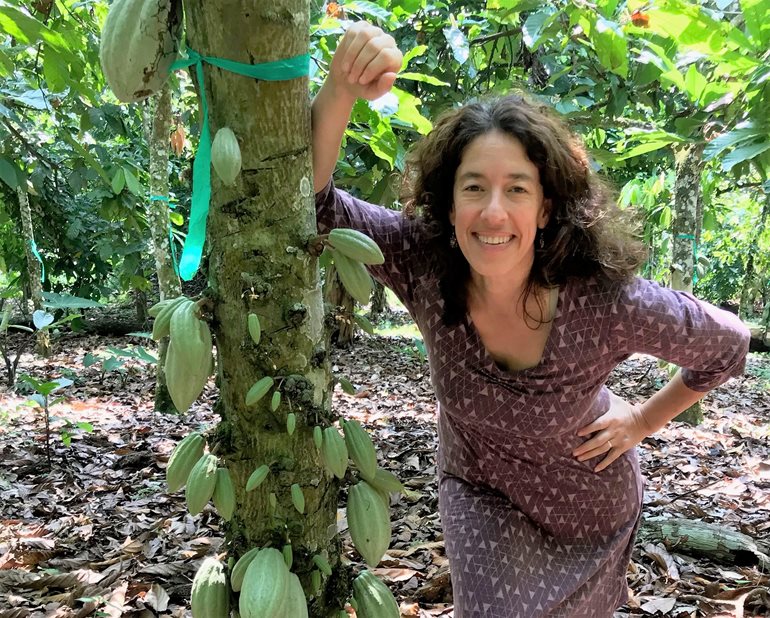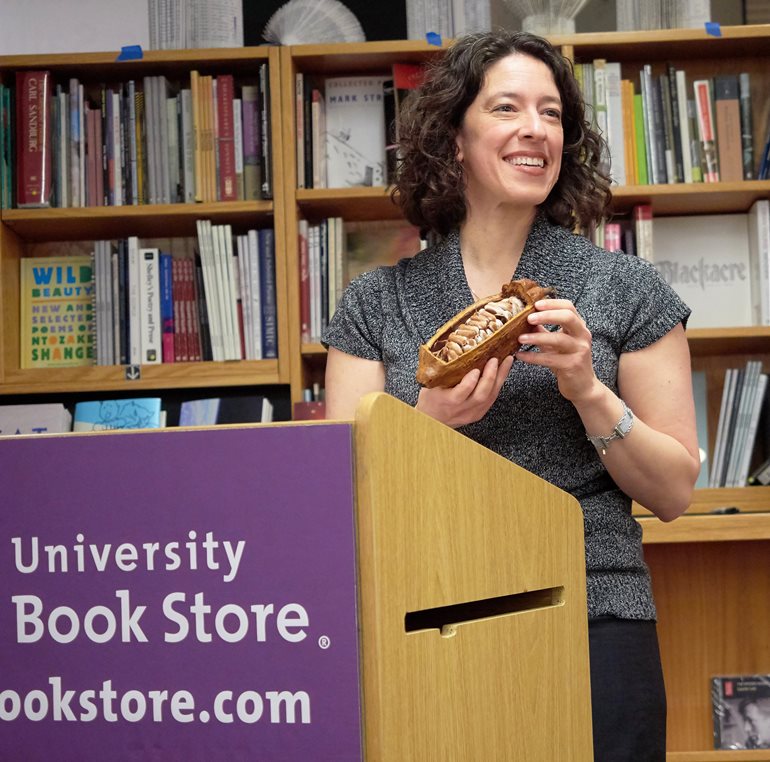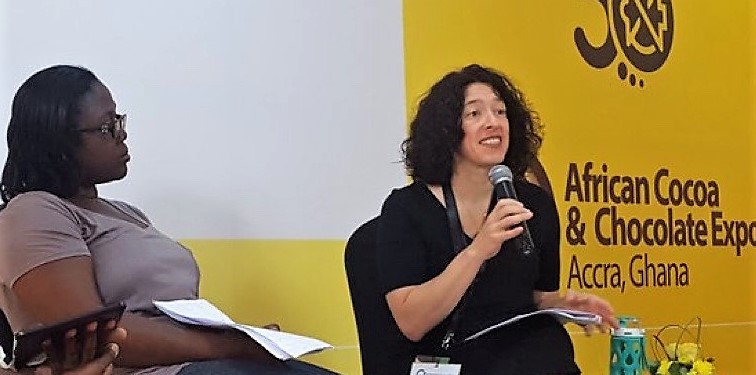
By Douglas Esser
An expert from the University of Washington Bothell on the culture, economics and politics of chocolate, Kristy Leissle is currently living in West Africa to conduct field work with cocoa growers for her next book on Africa’s contributions to chocolate.
In her 15 years of research, writing and teaching about chocolate, Leissle has looked deeply into a subject with which many people feel a personal sensory attachment. Think of a cookie. Now think of a warm, chocolate chip cookie.
“We’re so emotionally attached to chocolate because of the associations we have created between chocolate and love, chocolate and romance,” said Leissle, an affiliate faculty member.
The foremost Valentine’s Day gift, chocolate also is associated with other occasions and holidays such as anniversaries, Halloween and Easter that bring special meaning to the small cocoa bean.
Taste and enjoyment, however, are only a part of chocolate’s story.
A taste for teaching, research

In her last book, “Cocoa,” Leissle wrote about politics within the chocolate industry. She says she has an additional perspective now, working with cocoa growers who have a 365-day-a-year commitment to farms they hope to leave to their children.
Her grasp of history and economics — plus flavor tastings at almost every class meeting — made Chocolate: A Global Inquiry a popular course at UW Bothell where Leissle taught from 2009 to 2017 in the School of Interdisciplinary Arts & Sciences. It was an ideal class for Discovery Core, the series of courses that introduce first-year students to scholarship and research through interdisciplinary topics.
Students loved the experiential learning, she recalled. The course culminated in the UW Bothell Chocolate Festival, a final exam where students presented their research — yes, and chocolates — to visitors who asked exam questions such as “What is white chocolate?” or “What is fair trade?”
“It put the students in the position of being experts and showing off their knowledge in an interactive way. We had a lot of fun,” said Leissle, who also taught other courses to majors in Global Studies.
Since 2018, Leissle has been living in Accra, the capital of Ghana, one of the world’s biggest producers of cocoa beans.
“Living here, I can go into the bush any time I want and talk with farmers I know, people doing the everyday work,” Leissle said. “I have such an opportunity living here to understand the industry more profoundly.”
On the ground

Africa is the foundation of the chocolate industry and has been for 100 years, Leissle said.
“When you live here,” she said, “you see everyday reality. There is a lot to be celebrated or at least respected.”
Leissle is directly involved as the co-founder of a nongovernment, nonprofit organization, the Cocoapreneurship Institute of Ghana. Historically, the country has mostly exported its cocoa beans. The institute supports people who ask, “Why not keep cocoa in this country and make something out of it here?”
More Ghana businesses are making chocolate “from bean to bar” or adding value with innovations, she said. The institute offers support in ways such as holding the African Cocoa and Chocolate Expo and bringing a U.S. manufacturer of cocoa machinery to a local event to meet with entrepreneurs.
“Having that face-to-face interaction and feedback had never happened before. CIG was able to make that happen,” Leissle said.
Leissle also teaches courses at the institute, including a “Made in Ghana” session dedicated to local industries.
Transnational ‘de-expert’

Leissle became deeply interested in chocolate when she was a doctoral student at the University of Washington and applied for a Bonderman Travel Fellowship to study chocolate in different parts of the world. She was awarded the fellowship for four months of travel. Her adviser suggested she make the transnational investigation of chocolate her thesis.
Over the years of writing books, blogs and articles and giving talks, Leissle eventually became known as “Dr. Chocolate,” the expert. “I shared my expertise and told people what I thought,” she said.
But when she moved to Ghana, she realized she had to become like a student again. She needed to see the situation among farmers and chocolate makers with fresh eyes and not rely on what she already knew.
“It’s been a very interesting journey for me as a researcher to ‘de-expert’ myself when I’m in the field,” Leissle said. “It’s not my job to tell them their relationship with cocoa or chocolate. I’m in the position of learner now, getting to know people themselves and to bear witness to their reality.”
Finding interdisciplinarity where you are
Her experience has taught Leissle that many simple pleasures, such as chocolate, are actually quite complex. If she were teaching at UW Bothell today, she’d urge students to see that complexity in more things.
“What I’ve done with chocolate, you can do with anything, like the eyeglasses I’m wearing, the dress I’m wearing, this ring, all the books on the shelf behind me,” Leissle said in a video interview. “They all have their economics. They all have their politics. They all have their cultural aspect, their psychology even. Some of them have agricultural roots that we don’t even see. If you’re wearing cotton, it was growing from the ground at some point. This bookshelf was a tree.
“I would like for students to remember that the way I research and write about chocolate — coming at it from all these angles — we can actually do for anything,” she said. “I would hope that every student would find that thing that sparks their passion for research, their passion for knowledge, in the way that chocolate did for me.”
Leissle wants them to learn nothing is one-dimensional.
“Everything comes from this hugely interconnected, often international, supply chain,” she said. “We have opportunities for endless learning about anything we care about.”



